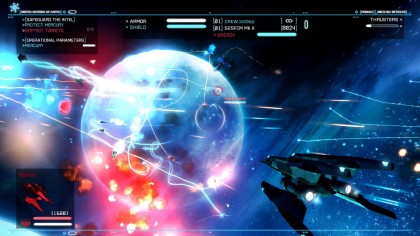Oculus Rift in space: gaming's final frontier
VR wars are about to kick off
As for whether EVE and Oculus might pair up more officially in the future, Reid won't confirm. At least officially. "We're exploring it," he strongly hints to TechRadar. "It does feel like there's something really interesting here."
Born again
But it won't stop with EVE and Strike Suit. As Born Ready's James Brooksby tells us, there are plenty of others getting on the ship.
"We sat there and went 'Ok, we really believe that space games should exist as a genre again," he says. "Other people started to play their hand in it and say 'We're working on one and we're working on one'. But we didn't see that as a bad thing. We just went 'Ok, that shows there is a lot of interest.'"

But as vast as space may be, Oculus has just as many opportunities to thrill us on the terra firma. In fact, the beauty of Rift is that the games are already out there - all it takes is for developers to pair the two together.
Every first-person title since the days of Doom could conceivable find itself with Oculus support. Fallout. Half-Life. Amnesia. Mirror's Edge. The list of titles that could pair with Oculus feels endless, and some, including Half-Life 2, are already supported.
Not to say that this is stopping developers creating new tailored experiences. From the sublime to the ridiculous, ideas are being thrown at Oculus that could very well change the very definition of gaming.
"It's the very simple ideas which is where the biggest innovation is coming from," Brooksby tells us.
Sign up for breaking news, reviews, opinion, top tech deals, and more.
A perfect example of this is City Quest, a 2D point-and-click game with a twist - you have to enter a 3D 1980s retro bedroom inside Oculus to play it. "So you walk into the bedroom, sit down and play it like an old platformer on the computer," says Brooksby. "And you can look around and see packets of crisps and things on the desk. Proper Inception stuff."
That the best ideas are coming from the independent developers should be of little surprise right now. Indie gaming is sieging the mainstream. The PS4 has pledged its allegiance to the indie developer market and the Xbox One has made the same vow.
Will they also be embracing Oculus with the same open arms? Well, that remains to be seen.
Putting the reality in VR
Of course, there have been several attempts to kick-start the VR machine in the past, but until now the idea has been restricted by its own technology.
"What's good about the way this is going at the moment is there's huge amounts of interest from the gaming side of things and big interest from the tech side of things," says Brooksby. "It looks like it's reaching more of a mass market."
And even better, the units are already out there in the hands of developers. "It's not like it's a pipe dream for just a few people, its already starting to get out there, and for not much more than the cost of a monitor. So I think there's a change this time around."
Oculus can also count gaming stalwart Peter Molyneux among its fans. "It was by far the best VR experience I've ever had," he tells TechRadar after taking Rift out for a spin.
However, he also suggests that developers don't get complacent with the wealth of titles already prepared for the Oculus treatment.
"I want an experience that's been crafted just for this," he says. "It needs the software to be written to support the hardware. You get past the 'Oh I can look around the world' and you immediately say to yourself 'Right, I want to do stuff'. I held my hands up and the fact I couldn't see my hands broke the experience."

Hugh Langley is the ex-News Editor of TechRadar. He had written for many magazines and websites including Business Insider, The Telegraph, IGN, Gizmodo, Entrepreneur Magazine, WIRED (UK), TrustedReviews, Business Insider Australia, Business Insider India, Business Insider Singapore, Wareable, The Ambient and more.
Hugh is now a correspondent at Business Insider covering Google and Alphabet, and has the unfortunate distinction of accidentally linking the TechRadar homepage to a rival publication.